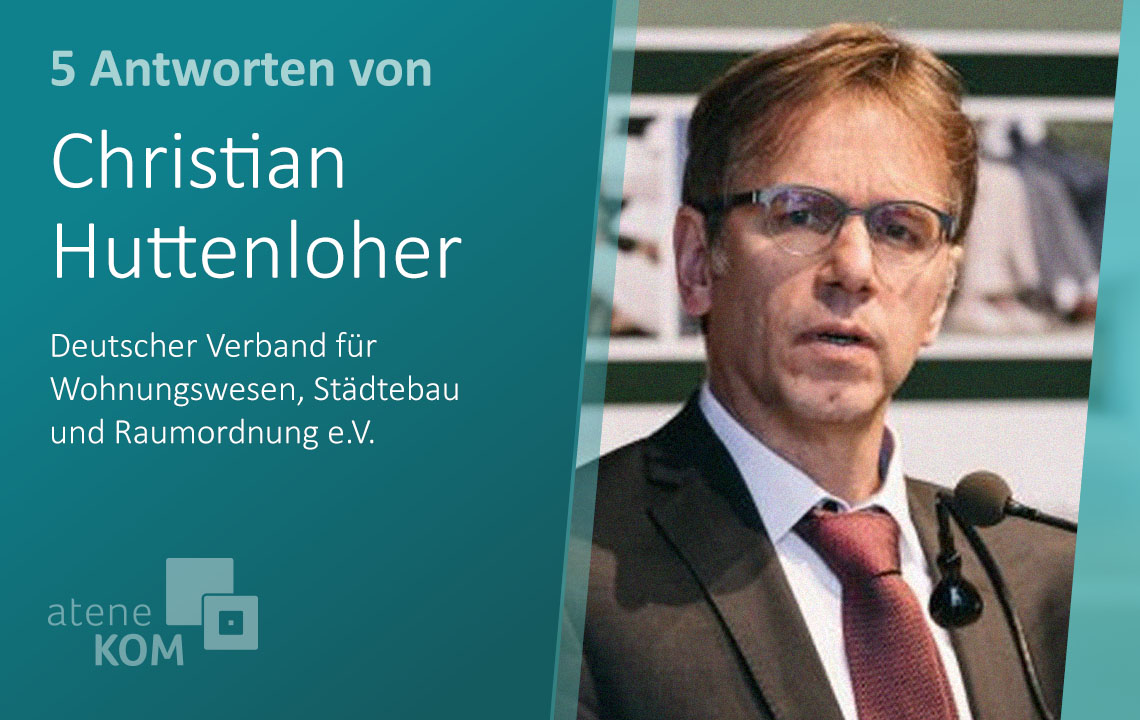In a smart city – an intelligent city – the focus should not be on technical solutions, but on the idea of a city worth living in, says Christian Huttenloher, Secretary General and Board Member of the German Association for Housing, Urban and Regional Planning (DV). In this interview, he explains how citizens’ everyday lives are being improved by digital applications and why it is so important for German cities and municipalities to exchange ideas as they move towards the smart city.
aconium: Which German city do you think is most likely to be a smart city?
Christian Huttenloher: It’s impossible to say in general terms because every city and every municipality has found its own approach and its own priorities. I see Munich, Cologne and Hamburg very far ahead – but also Leipzig. The city in Saxony, for example, focuses on citizen participation and involves the local economy in the digitalization process. It is noticeable that cities and municipalities in Germany usually digitalize partial aspects first and look for intelligent applications that suit their own city – unlike cities in the Arab or Asian region, for example, which are building entire new districts and equipping them with digital applications from the outset.
aconium: How can smart city solutions improve the everyday lives of citizens?
Huttenloher: There are many small applications that make everyday life easier. In Berlin, for example, it is possible to make appointments at the citizens’ office online. This saves citizens numerous phone calls – and therefore time. Another example is mobility apps that are not just limited to one city, but cover entire regions. Participation processes can also be simplified: The city of Hamburg surveyed its citizens online about the location of refugee homes. This gives the city administration feedback from the population that it would otherwise not have received.
aconium: What challenges are there in the introduction of smart city solutions in Germany?
Huttenloher: There is a lot of discussion in cities and municipalities about how the city administration can retain sovereignty and control over what happens in the smart city – and not lose it to the companies that offer the digital applications. Local authorities must not become too dependent on the providers and their systems. This also concerns the issues of data sovereignty and data security.
Another challenge facing cities is their own internal development. Cities and local authorities have a responsibility to manage and drive forward smart city processes. In doing so, they must bear in mind that digital change is progressing so quickly that lengthy conception phases are no longer appropriate. Flexible concepts are needed here instead of rigid 15-year plans, otherwise smart city ideas will quickly become outdated.
aconium : What specifically needs to change for German cities to become smarter?
Huttenloher: An intensive exchange between cities is essential if more cities are to become smart. We need model projects and research projects that test smart city applications in practice. The participating cities must then share their experiences with the municipalities that are still at the beginning. A good approach is the funding of smart city model projects by the Federal Ministry of the Interior, Building and Community – if there is also an exchange of experience with other cities.
aconium: How do you envision the ideal smart city?
Huttenloher: For me, an ideal smart city doesn’t just consist of purely technical solutions, but is first and foremost a healthy and liveable city. Digital applications then enable better environmental values, for example, because traffic is intelligently controlled and networked with the energy supply. In a smart city, the infrastructure is managed efficiently and I can find my way around better as a stranger because information about stores, restaurants or important places is available to me at all times.

